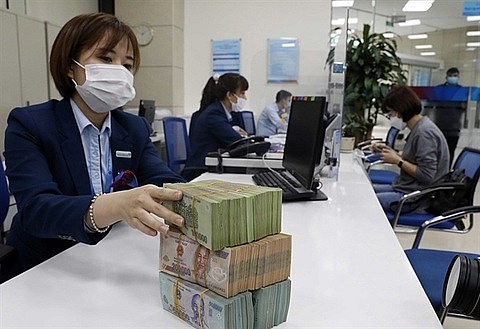Large bond investment funds' NAV hit three-year low
According to cafef.vn, most bonds are trading below par value by 4-5 per cent, and with an addition of a 10-12 per cent yield, it means sellers accept a 14-17 per cent discount. Investors are even willing to sell fund certificates.
 |
| An employee prepares to hand over the Vietnamese bank notes to a customer at a transaction office of Vietinbank in Ha Noi. - VNA/VNS Photo Tran Viet |
The sudden, large-scale withdrawal from funds has also caused the net asset value (NAV) of open-ended bond funds to decline deeply. According to estimates at ten large bond funds, the total NAV is now only about VND13.5 trillion, the lowest in recent years and down VND6.2 trillion compared to the end of October. The figure even dipped by VND12.3 trillion compared to the beginning of this year.
In the previous two years, 2020 and 2021, open-ended bond funds attracted a large number of investors because of their flexible investment mechanism, which was suitable for those with small investments. At the peak of this period, which was from June to October 2021, the total NAV of the ten large open-ended bond funds regularly stayed around the threshold of VND28-30 trillion. However, movements from the beginning of the year reversed that trend.
The NAV of open-ended bond funds began to plunge after the scandal of Tan Hoang Minh and only recovered slightly between May and September. The trend suddenly reversed in October, causing the total NAV of the funds to plummet below VND19.7 trillion at the end of last month.
The fall was mainly driven by the strong net withdrawal of investors while the mobilised value was very low, with many open-ended funds barely able to raise new money during the period.
Most open-ended bond funds’ size has shrunk since early November, but to varying degrees. TCBF still leads in terms of size, with a NAV of about VND10.7 trillion, but it has fallen sharply from more than VND16 trillion at the end of last month.
Compared to the peak recorded at the end of June 2021, the size of TCBF has decreased by about VND16 trillion, equivalent to 60 per cent. MBBond and SSIBF also saw significant slides in size, down 39 per cent and 22 per cent, respectively, compared to the end of October.
Moreover, the race to increase savings interest rates also affected the activities of open-ended bond funds. Although savings interest rates are not as attractive as those of bond fund certificates, bank deposits are still basically a safer channel, especially amid the many unpredictable fluctuations in the market.
However, it should be noted that bond funds have professional investment teams and hold the bonds of leading enterprises in many fields. The investment activities of these funds are also diversified, with risk assessment and management complying with professional standards.
Therefore, investors should not be panic and should carefully consider the quality of the bond portfolio held by the investment funds before making a decision, avoiding withdrawal at all costs to protect their own interests.
 | The significant growth of green bonds The development of the green financial market is a crucial topic of focus both globally and domestically. Do Minh Chau, green finance analyst at FiinRatings, looks at the prospects of sustainable bonds and the current interest in Vietnam’s green finance market. |
 | Message from government about resolving corporate bond issue The Government has issued Resolution 143/NQ-CP of its regular meeting in October. |
What the stars mean:
★ Poor ★ ★ Promising ★★★ Good ★★★★ Very good ★★★★★ Exceptional
Related Contents
Latest News
More News
- Private capital funds as cornerstone of IFC plans (February 20, 2026 | 14:38)
- Priorities for building credibility and momentum within Vietnamese IFCs (February 20, 2026 | 14:29)
- How Hong Kong can bridge critical financial centre gaps (February 20, 2026 | 14:22)
- All global experiences useful for Vietnam’s international financial hub (February 20, 2026 | 14:16)
- Raised ties reaffirm strategic trust (February 20, 2026 | 14:06)
- Sustained growth can translate into income gains (February 19, 2026 | 18:55)
- The vision to maintain a stable monetary policy (February 19, 2026 | 08:50)
- Banking sector faces data governance hurdles in AI transition (February 19, 2026 | 08:00)
- AI leading to shift in banking roles (February 18, 2026 | 19:54)
- Digital banking enters season of transformation (February 16, 2026 | 09:00)

 Tag:
Tag:



















 Mobile Version
Mobile Version